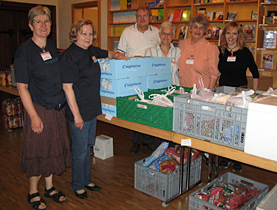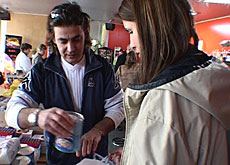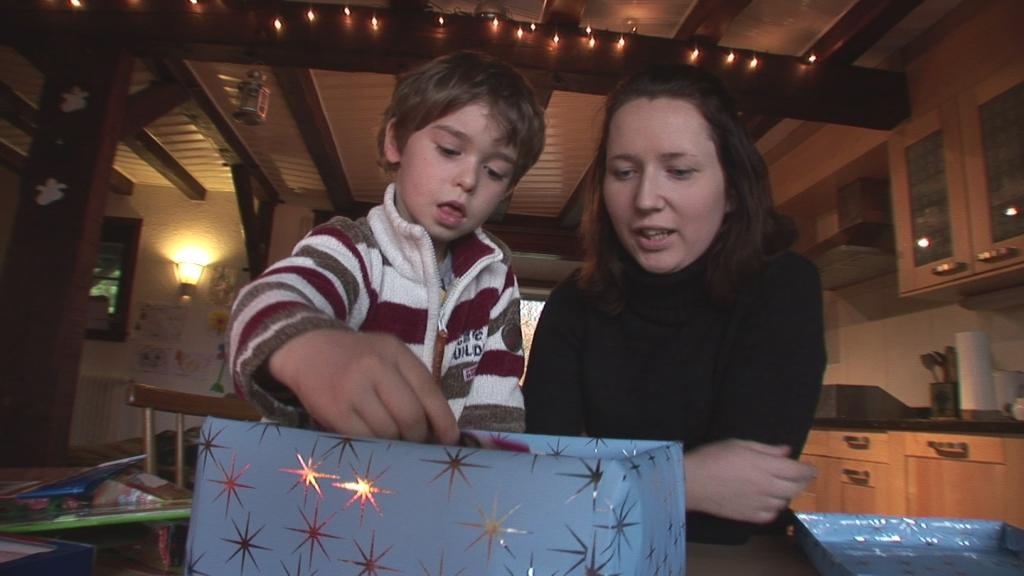Putting food on the table during tough times

While many Swiss are concerned about job security, wage cuts and pension funds, people here trapped in poverty remain in need of more immediate necessities.
In the city of Lucerne, charities, churches, corporations and volunteers are partnering to give a helping hand to those who worry about where their next meal will come from.
“Look at the nice cheese we got today. I’d like to give it to a big family, or maybe we should divide it up. Hmmm…” says Marianne Sommerhalder. In less than an hour, about 70 people will arrive to collect the food donated by grocery stores and factories.
Sommerhalder is the director of the Lucerne branch of Tischlein deck dich, a Swiss organisation that distributes surplus food to those in need. Every Tuesday afternoon, the foyer of St Mark’s Church turns into a mini-market for low-income individuals of all ages and nationalities.
In Switzerland, 250,000 tons of food go to waste every year.
“The amount of food thrown away annually could fill a caravan of trucks lined up from Aarau to Lugano – a distance of 235km,” says Caroline Schneider, the spokeswoman for Tischlein deck dich.
Of that amount, it’s estimated that 25,000 tons would in fact be edible – yet it ends up in the garbage because it’s past its sell-by date.
According to Sommerhalder, “It’s easier for stores and producers to throw things out rather than set them aside neatly.”
So the charity is most grateful to the 400 food donors who take the time to rescue and help redistribute items approaching their use-by date. Some of the food comes from Schweizer Tafeln, an organisation that delivers to soup kitchens, shelters and other institutions.
Enough for everyone
As soon as the food arrives in Lucerne, Sommerhalder needs to be quick in arithmetic and decision-making. She and her team never know what they’ll get, or how much of it.
“We distribute according to family size, but we don’t know how many people will come, exactly. It’s important to give the fresh items away promptly; we don’t want there to be leftovers,” says Sommerhalder.
When swissinfo.ch visited, there was bread, pasta, yoghurt, prepared salad, assorted fruits and vegetables, juice, cherry jam, sardines, wasabi paste, snack chips and spices. And then there were the chocolate Easter bunnies and eggs – in June.
“That’s good, too. A lot of the people can’t afford sweets,” points out Sommerhalder. Indeed, the chocolate soon proves to be a big hit with the children.
As the people arrive, they cast their eligibility cards into a box at the door. These are available through social services and reserved for those living at or below the poverty level. The cost per visit is one Swiss franc.
No self-service is allowed; instead, volunteers help each shopper fill the bags according to household size. While waiting for their turn, people can enjoy a beverage and a chat.
The goal of the programme is to supplement cupboard contents – not to take the place of a proper week’s shopping. Clients appreciate the variety it adds, especially when they receive the occasional luxury or exotic item.
“For a family with a small budget, it’s a big help. You pay one franc, but the value is easily SFr20-30,” says Michel von Rotz of Lucerne. Though not eligible himself, he sometimes picks up food on behalf of his girlfriend; the couple has a young child.
“The people are very nice, and the social contact is good, too,” adds von Rotz, noting that a free cup of tea is a bonus if you don’t have the cash for a café visit.
Hungry for more
Thanks to word of mouth, the demand for additional Tischlein deck dich branches has steadily increased over the years.
“We get a lot of calls from individuals and communities asking for new distribution points, but there are two things to consider first: Is there enough food? And are there enough drivers and vans to distribute it?” says Schneider.
Ten new locations are scheduled to open in 2009. Schneider says they haven’t noticed a significant increase in recipients on account of the world economic crisis.
But what they have observed is that the workers referred to them through unemployment agencies are better qualified than those who were jobless in other years. Tischlein deck dich provides ten positions that are financed through unemployment insurance.
Neither Tischlein deck dich nor Schweizer Tafeln takes its donors for granted – especially during these times.
“We’re anxious to see whether the crisis translates into a reduction of donations. But in summer the stock is usually smaller,” says Schneider.
Beat Fisler, deputy director of Schweizer Tafeln, has not noticed a decrease in the amount of food donated.
“Sometimes we don’t get as many fresh items. When that happens, we try to compensate with non-perishable products,” says Fisler.
Sponsors
In addition to the food itself, financial contributions are a key ingredient in the work done by Tischlein deck dich and Schweizer Tafeln.
“We don’t get money from the government – we depend on our sponsors. So we hope that sponsorship budgets won’t be cut next year on account of the world financial crisis,” says Fisler.
In the form of food and funding, the Coop chain of supermarkets has supported both Tischlein deck dich and Schweizer Tafeln for years.
“We’ve had very good experience with both organisations,” says Coop spokeswoman Denise Stadler. “And regardless of the economic situation, we always have surplus food to share.”
Meanwhile, there’s no shortage of volunteers; 940 people donate their time to further the cause of Tischlein deck dich.
Diana Schmid, a volunteer at Lucerne’s Tischlein branch, finds the work rewarding: “I really enjoy it. You meet a lot of nice people that you might not meet otherwise.”
Susan Vogel-Misicka, swissinfo.ch
Tischlein deck dich is based in the central town of Winterthur.
In 2009 it is celebrating its 10th anniversary.
It’s name, meaning literally: “Little table, be covered” comes from a fairy tale: the words summon a magic tablecloth which brings an endless feast.
It currently has 64 branches all over the country, with 10 more planned for this year.
Last year a total of 1.2 tonnes of food were given to 9,000 people, equivalent to 6.35 full plates.
When it started in 1999 it handed out 18,000 kilogrammes, amounting to 72,000 plates.
The food is provided by some 400 sponsors. They donate for such reasons as that it is nearing its sell-by date, the packaging is damaged, or too much was produced.
According to the organisations, “hidden poverty” affects mainly large families, people in badly paid jobs, single parents, people who are no longer entitled to benefits and those on the fringes of society.

In compliance with the JTI standards
More: SWI swissinfo.ch certified by the Journalism Trust Initiative


You can find an overview of ongoing debates with our journalists here. Please join us!
If you want to start a conversation about a topic raised in this article or want to report factual errors, email us at english@swissinfo.ch.